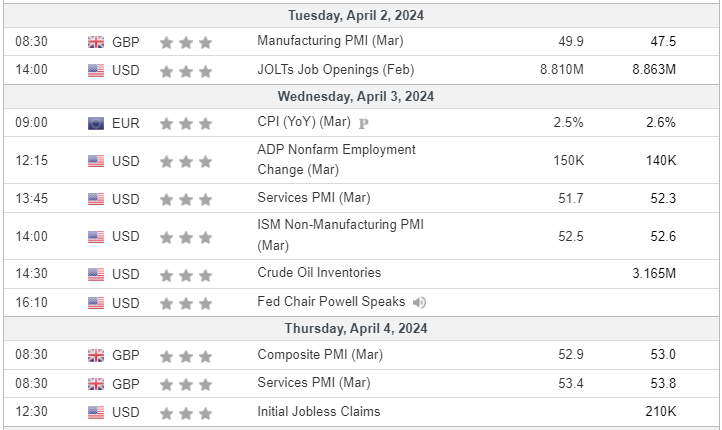
The economic calendar is a vital tool for understanding the ebbs and flows of the market. By keeping an eye on key indicators such as CPI, Core PCE, GDP, consumer confidence, and unemployment rates, stakeholders can gauge the health of an economy and make informed decisions. The significance of these indicators often varies with the economic cycle, highlighting the need for a nuanced interpretation.
CPI and Core PCE in Detail
Inflation measures like the Consumer Price Index (CPI) and the Core Personal Consumption Expenditures (Core PCE) are crucial for understanding purchasing power and cost of living. For instance, during inflationary periods, these indicators guide central banks' monetary policies, affecting everything from interest rates to investment strategies. Historical data suggest that rising CPI and Core PCE often precede tightening monetary policies aimed at curbing inflation.
GDP’s Broader Implications
Gross Domestic Product (GDP) serves as the broadest measure of economic activity. It's a critical indicator during periods of economic recovery or recession, as it encompasses consumer spending, government expenditure, investments, and net exports. A rising GDP signals economic expansion, often leading to increased consumer confidence and investment, while a contracting GDP indicates recessionary pressures, prompting policy interventions.
Consumer Confidence and Economic Sentiments
Consumer confidence is a leading indicator of economic health, reflecting the optimism or pessimism of households towards their financial situations and the broader economy. High levels of consumer confidence typically lead to increased spending, fueling economic growth, whereas low confidence can signal economic downturns, guiding investors and policymakers in their decisions.
Unemployment Rate’s Impact Across the Board
The unemployment rate is a lagging indicator, reflecting the health of the labor market. High unemployment rates can decrease consumer spending and confidence, leading to a slower economy. Conversely, low unemployment suggests a robust economy, potentially leading to wage inflation and influencing central banks' interest rate decisions.
Central Bank Monetary Policy’s Ripple Effects
Central banks wield significant influence over the economy through their monetary policy decisions. Interest rate adjustments directly impact borrowing costs, consumer spending, and overall economic growth. For example, rate cuts in response to economic slowdowns aim to stimulate borrowing and spending, whereas rate hikes during economic booms seek to cool inflation.
The Fluid Importance of Economic Indicators
The relative importance of economic indicators shifts with the current economic landscape. During recessions, unemployment data and GDP figures receive heightened attention, while inflation measures like CPI and Core PCE dominate headlines in expansionary periods. Understanding these dynamics is key to navigating the market successfully.
Summaries of Economic Indicators
CPI and Core PCE: Gauge inflationary pressures, influencing monetary policy and economic strategies.
GDP: Measures overall economic activity, guiding policy decisions and investor sentiment.
Consumer Confidence: Predicts consumer spending patterns, indicating economic trends.
Unemployment Rate: Reflects labor market health, affecting economic stability and policy responses.
Central Bank Monetary Policy: Shapes economic growth and inflation through financial measures.
Navigating the economic calendar requires more than just a cursory glance at figures; it demands an understanding of each indicator's role within the broader economic narrative. As economic conditions change, so too does the focus on specific indicators. By staying informed and adaptable, investors, policymakers, and businesses can make decisions that align with both current conditions and future prospects.
Like this article? Read more from my Investing.com profile here:
https://uk.investing.com/members/contributors/256252463
Disclaimer: Any content in this article is purely financial markets discourse and not financial advice. Please consult a regulated professional before making any financial decisions.
- English (USA)
- English (India)
- English (Canada)
- English (Australia)
- English (South Africa)
- English (Philippines)
- English (Nigeria)
- Deutsch
- Español (España)
- Español (México)
- Français
- Italiano
- Nederlands
- Português (Portugal)
- Polski
- Português (Brasil)
- Русский
- Türkçe
- العربية
- Ελληνικά
- Svenska
- Suomi
- עברית
- 日本語
- 한국어
- 简体中文
- 繁體中文
- Bahasa Indonesia
- Bahasa Melayu
- ไทย
- Tiếng Việt
- हिंदी
Deciphering the Economic Calendar: Navigating Through Economic Cycles
Published 31/03/2024, 07:10
Updated 07/04/2024, 17:07
Deciphering the Economic Calendar: Navigating Through Economic Cycles
3rd party Ad. Not an offer or recommendation by Investing.com. See disclosure here or
remove ads
.
Latest comments
insightful
Install Our App
Risk Disclosure: Trading in financial instruments and/or cryptocurrencies involves high risks including the risk of losing some, or all, of your investment amount, and may not be suitable for all investors. Prices of cryptocurrencies are extremely volatile and may be affected by external factors such as financial, regulatory or political events. Trading on margin increases the financial risks.
Before deciding to trade in financial instrument or cryptocurrencies you should be fully informed of the risks and costs associated with trading the financial markets, carefully consider your investment objectives, level of experience, and risk appetite, and seek professional advice where needed.
Fusion Media would like to remind you that the data contained in this website is not necessarily real-time nor accurate. The data and prices on the website are not necessarily provided by any market or exchange, but may be provided by market makers, and so prices may not be accurate and may differ from the actual price at any given market, meaning prices are indicative and not appropriate for trading purposes. Fusion Media and any provider of the data contained in this website will not accept liability for any loss or damage as a result of your trading, or your reliance on the information contained within this website.
It is prohibited to use, store, reproduce, display, modify, transmit or distribute the data contained in this website without the explicit prior written permission of Fusion Media and/or the data provider. All intellectual property rights are reserved by the providers and/or the exchange providing the data contained in this website.
Fusion Media may be compensated by the advertisers that appear on the website, based on your interaction with the advertisements or advertisers.
Before deciding to trade in financial instrument or cryptocurrencies you should be fully informed of the risks and costs associated with trading the financial markets, carefully consider your investment objectives, level of experience, and risk appetite, and seek professional advice where needed.
Fusion Media would like to remind you that the data contained in this website is not necessarily real-time nor accurate. The data and prices on the website are not necessarily provided by any market or exchange, but may be provided by market makers, and so prices may not be accurate and may differ from the actual price at any given market, meaning prices are indicative and not appropriate for trading purposes. Fusion Media and any provider of the data contained in this website will not accept liability for any loss or damage as a result of your trading, or your reliance on the information contained within this website.
It is prohibited to use, store, reproduce, display, modify, transmit or distribute the data contained in this website without the explicit prior written permission of Fusion Media and/or the data provider. All intellectual property rights are reserved by the providers and/or the exchange providing the data contained in this website.
Fusion Media may be compensated by the advertisers that appear on the website, based on your interaction with the advertisements or advertisers.
© 2007-2024 - Fusion Media Limited. All Rights Reserved.
